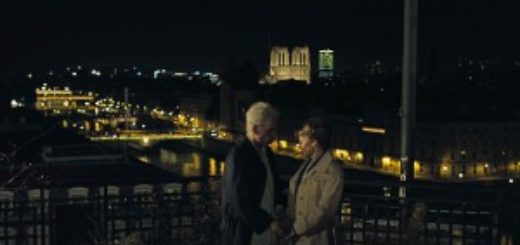Jojo Rabbit @ Nashville Film Festival
Nashville Film Festival Coverage via Jason Sparks Our Man In Nashville
The argument goes something like this: the problem with blockbuster, big-budget, “popcorn movies”—or, as they’re usually called now, superhero movies—is that they are or will be the death-knell for smaller films, AKA arthouse films, AKA indie films…you get the idea.
Then, however, you have to factor in someone like Taika Waititi. On the one hand, he Maori-born director helmed Thor: Ragnarok—in other words, he gave us the spectacle of Thor fighting The Incredible Hulk. On the other hand, he has also created a film that has taken the festival circuit by storm, including (as of this week) the Nashville Independent Film Festival. That film is called Jojo Rabbit, and it will likely leave the snobbier circles of film criticism inclined to forgive him his comic-book indulgences.
The title Jojo Rabbit refers to the main character, a ten-year-old boy named Johannes Rensler (Roman Griffin Davis) with all the growing pains and awkwardness common of any boy his age, who mitigates that pain & awkwardness through conversations with an imaginary friend. Here’s the thing: Johannes is 10 in 1945, he’s living in an unnamed German village, and his imaginary best friend is Adolf Hitler (Taika Waititi). The boy is a zealous Nazi, eager to attend a Hitler Youth summer camp and learn all he must to serve der Fuhrer. As it happens, though, he’s still more of a child than a Nazi, and his child nature gets in his way. He has to leave camp after injuring himself with a grenade, which he achieves by throwing the grenade, only to have it bounce off of a tree and land back at his feet. It’s shortly before the grenade incident that he earns the nickname “Jojo Rabbit”, when he refuses to prove he’s ready to kill for the cause by killing a rabbit. He and the rabbit both run away; he, however, unlike the rabbit (we can assume), is consoled by the imaginary Adolf.
While Jojo is recuperating he meets Elsa (Thomasin McKenzie), a Jewish girl living in hiding. Jojo is horrified, at first, then views her as a challenge: inspired by a flippant comment by the director of the Hitler Youth camp, he decides to write a book detailing all the “mysteries” of Jews, which he expects to learn from Elsa. “Where are your horns?”, he asks her, in all sincerity; relishing the moment, she explains—“We don’t get them until we’re twenty-one”.
It could be said that the journey Jojo is about to make is patently obvious at this point: what happens when a wide-eyed true believer in hatred actually encounters The Other, and that Other’s overwhelming humanity? What happens when a ten-year-old boy encounters a teenage girl—let alone a teenage girl who has to remain a secret? In both cases, the answer is, “exactly what you think is going to happen”, but that does not diminish the joy in taking the journey with him. What might diminish it, of course, is that the child is literally a Nazi whose imaginary best friend is Hitler himself.
Waititi has made some masterful choices here, choices which make it possible to sympathize with the lad. For one thing, this film is set in Nazi Germany, but with air quotes around the phrase. Footage of Nazi rallys is accompanied by Beatles songs (performed in German), and the actors deliver their dialogue in English, but through purposely hammy, ve-haff-vays-0f-makink-you-talk German accents (and their dialogue is laced with spins on modern slang; Rebel Wilson, brilliant here as an instructor at the camp, expresses surprise by saying, “OMGott!”). These choices, I think, blunt the edge of Nazism, telegraphing to us that what we’re watching is a surreal burlesque. The Nazism needs blunting, of course, if we are to sympathize with Jojo; with the edge taken off, we can focus on Jojo as he truly is—a misguided child, seeking a place to belong and choosing entirely the wrong place. We all know a Jojo Rabbit, especially in the current political climate—this movie could serve as a primer on how to gently, but assertively, handle such a person.
Waititi’s casting is another masterful choice. Davis’s Jojo is as sincere as he is scared, and we see clearly that he lives at the tipping point of hatred and humanity, boy and man, which is no small feat for any actor, let alone a child actor. Scarlett Johannson conveys a world-weary but optimistic mother, one who wants her son to outgrow his hatred. As Elsa, Thomasin McKenzie is a force to be reckoned with (for Jojo, anyway); her anger and fear as a refugee manifests as endless trolling of the boy. Perhaps the most vivid portrayal in the film is given by Waititi himself (who also wrote the screenplay, in addition to directing); he chooses here to make Hitler petulant and childish—the meanest Mean Girl ever, but with the energy of a cartoon character. He may be Hitler, but he’s also Jojo’s BFF—at least until Jojo’s relationship with Elsa develops, which (briefly) drives Hitler into the kind of, well, Hitlering we usually think of—the kind the world of memes bring us via Bruno Ganz. Also on hand (and stealing every scene he’s in) is Sam Rockwell as Captain Klenzendorf—“Chust call me ze Captain K, ja?”—as the jaded director of the camp, Stephen Merchant as a delightfully blasé Gestapo officer, and Archie Yates as Yoakie, Jojo’s real-life best (read: only) friend.
If Jojo Rabbit plays at your local arthouse, see it. It may be a film from someone who has also created (clutch pearls in 3, 2…) superhero movies, but it’s a fantasy that speaks to past and current realities, it’s supremely acted and written, and it’s both hilarious and bittersweet. It’s an incredible film.























Thanks for the probing and timely review. I’m a little exhausted by the recent over-saturation of super hero movies, and this perverse but historically grounded film seems as a erll-needed cleansing of the palate.